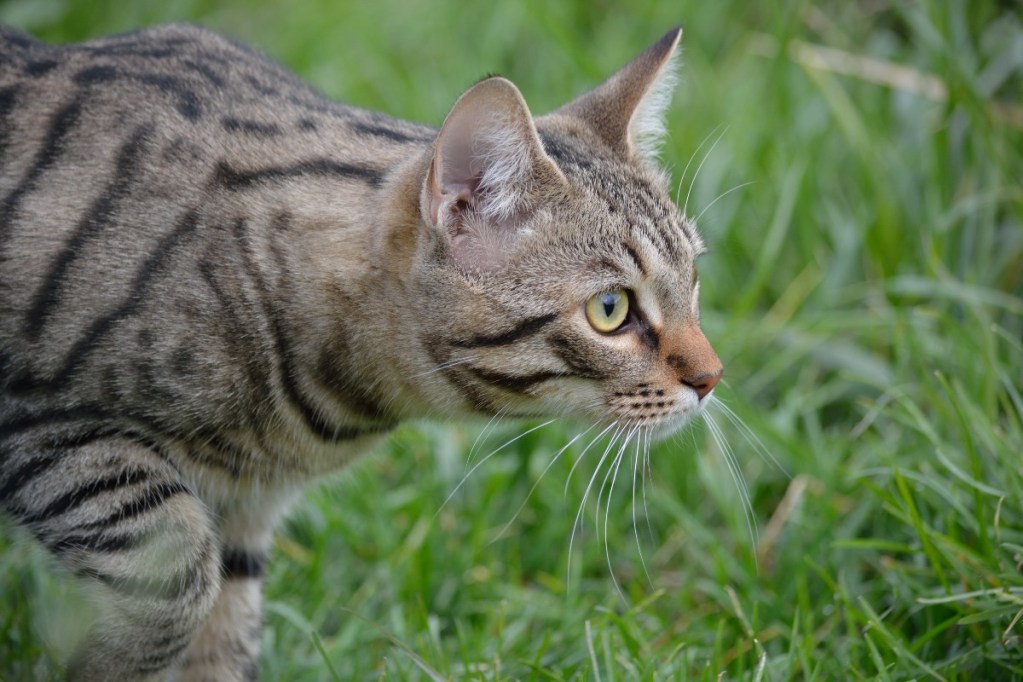
If your cat has access to the outdoors, then chances are you’ve seen him munching on grass at some point. This behavior isn’t unusual for cats — Science reports that of 1,000 cat owners surveyed, 71% caught their cats eating grass at least six times since having the pet. Some cats may eat grass more often than others, especially if they spend lots of time outside, where they have plenty of access to the grass of their choice.
While it might seem strange that your cat eats grass, especially if they vomit it up afterward, this is pretty typical behavior. However, it’s important to be aware of a few risks so you can help keep your cat safe. So, why do cats eat grass? Keep reading, as there are multiple potential reasons.
Potential reasons why cats eat grass

Your cat might seek out grass because he’s looking to support his digestive health. Grass can act like a laxative for felines, and if your cat has ingested something that he’s having trouble digesting, like bird or mouse bones, he might instinctively seek out grass. Grass can help support regular bowel movements and essentially clean out your cat’s system.
It works the other way, too. Cats often vomit after they eat grass, and this might benefit them if they’re having trouble digesting substances or foreign objects. So even if they are vomiting–it may be on purpose!
It’s also possible that grass offers cats valuable nutrients. Grass is rich in folic acid, which helps oxygen move within your cat’s blood. Your cat might crave grass as a way of getting additional nutrition, though this is not something they can verbalize to you.
It’s also possible that your cat thinks that eating grass is entertaining. Some cats may snack on grass out of boredom, or they might like its taste or texture. They could even be hunting for bugs and other small critters!
The risks of cats’ eating grass

While the act of eating grass isn’t harmful to cats, your cat’s health and safety could be at risk if he eats grass that’s been treated with fertilizer, weed killer, or other chemicals. When your cat eats grass outdoors, you can’t know for certain what that grass has been exposed to. As a result, it’s possible that your cat could ingest harmful toxins.
It’s also possible that your cat could ingest a toxic plant while he’s eating grass. It’s always wise to ensure that anything you plant in your garden or yard is cat-safe, but you won’t necessarily be able to keep your cat from wandering into your neighbors’ gardens and eating what’s growing there. This is just one more reason to consider keeping your cat indoors!
How to keep your cat safe while satisfying his grass-eating habit

One of the best ways to keep your cat safe while still letting him eat grass is to grow grass for him indoors. There are plenty of cat grass gardens and grass seeds that you can use to easily and quickly grow grass in your home. That’s how common this is! Cat grass is easy to grow, and it requires only a little watering and sunlight. Some stores even sell pots of live cat grass, so you don’t have to worry about growing it yourself.
When you grow your own cat grass, you can offer it up to your cat daily, so he always has grass available if he feels he needs or wants it. You’ll need to experiment with how much grass your cat eats, but by establishing two or three different pots of grass at different growth stages, you can usually keep up with most cats’ eating and playing habits.
If your cat spends unsupervised time outside, it will be difficult to ensure that he doesn’t eat grass. When your cat is indoors only, ensuring that he has access only to the grass that you’ve grown is much easier.
When to be concerned about your cat eating grass

Although it’s very common for cats to munch on grass occasionally, there are a few circumstances when you’ll want to keep an eye on what they’re putting in their mouths. If your furry friend has been experiencing sudden digestive issues, for example, it’s worth observing their grass-eating habits. Is the grass a response to feeling unwell? Or do their symptoms stop when they stop eating grass? There’s only one way to find out!
If your cat begins to act differently before, during, or after eating grass, you’ll also want to keep them nearby in case of other sudden symptoms. As a rule of thumb, any sudden or unusual behaviors are worth keeping an eye on! Calling your cat’s veterinarian is the best way to go if these changes persist or your cat shows signs of pain, discomfort, or illness.
All in all, it’s normal for cats to eat grass

It’s natural for cats to eat grass, so if you notice this behavior, don’t worry too much. Chances are, your cat is just listening to a natural instinct. Whether he’s eating grass to soothe his digestive system, entertain himself, or get nutrients that he’s missing is uncertain, but in most cases, it’s harmless for your cat to eat grass.
To be extra safe, try to offer up only grass that you’ve grown yourself. Giving your cat access to grass that’s safe for him can help keep him healthy and happy, and it may even break up boredom for your indoor cat.


